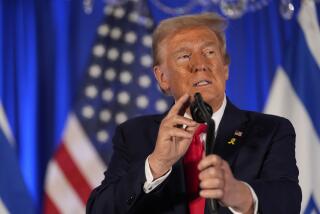Clinton, Yeltsin Fail to Connect on Bosnia Issue
- Share via
WASHINGTON — They can shoot astronauts into space together, but apparently the United States and Russia cannot arrange a phone call between their leaders.
Because of what is being described as “technical and scheduling” difficulties, President Clinton has been unable for two days to get through to Russian President Boris N. Yeltsin to discuss the North Atlantic Treaty Organization demand that the Bosnian Serbs withdraw their artillery from Sarajevo. The issue is a delicate one, because many Russians have reacted bitterly to what they see as a hostile act toward a group with whom they have long been allied.
While U.S. officials insisted that the foul-up is attributable to glitches in special telephones that encode messages, it has stirred speculation that Yeltsin might be snubbing Clinton over the Bosnian plan or perhaps avoiding an issue that puts him in a tight spot between his Western allies and Russian public opinion.
In Russia, Yeltsin’s absences from the public eye always prompt speculation that the president is gravely ill, otherwise incapacitated or simply drunk. An aide said that Yeltsin had been working at his dacha , or country home, about 20 miles west of Moscow at Zavidovo, because of a cold he contracted on a trip to Georgia.
The glitches also raise questions about the reliability of vital communications links, celebrated in Cold War lore, between two technically advanced countries.
Clinton said Thursday that the attempts will continue. “I am trying to get in touch with him, and he knows that I will take the call whenever we can put it together,” he said.
White House technicians tried to hook up the leaders a number of times between late morning and early afternoon Wednesday, without success. Clinton went to bed Wednesday night expecting to be awakened by a call from Yeltsin’s dacha . But the call never came.
The snag marked at least the second time that secure phones have caused diplomatic problems--or offered convenient excuses--during the Clinton Administration. U.S. officials said that British Prime Minister John Major’s complaints about Clinton not returning his calls arose because of difficulties with the same glitch-prone phones.
The technicians tried again Thursday and plan to repeat their efforts today. Because of the eight-hour time difference between Moscow and Washington, there are only about five or six hours when calls are convenient to both leaders, officials said.
The United States and Russia have been linked by a celebrated “hot line” since the 1960s, but it can be used to transmit messages only, as it does not carry voices. Another voice line was installed, with some fanfare, in December between the offices of the U.S. secretary of defense and his Russian counterpart.
Yeltsin has a high-frequency satellite telephone connected to a special military-run telephone system that once linked all high-ranking Soviet officials. The Russian president is thought to have extensions in his presidential limousine, helicopter and jet, as well as in his dacha , where he spends most of his time.
U.S. officials insisted that Yeltsin has no intention of snubbing Clinton. This was signaled, they said, by communications at the staff level, between National Security Adviser Anthony Lake and U.N. Ambassador Madeleine Albright and their counterparts.
And they insisted that the technology does not present real problems. “If there was a real emergency, we’d be able to hook up,” said Dee Dee Myers, the White House press secretary.
On Thursday, Russian Foreign Ministry spokesman Grigory Karasin said that the Russian leadership is in constant contact through diplomatic channels with Americans and with other Security Council members.
A Yeltsin adviser, Mikhail Poltoranin, said that he did not know Clinton was trying to talk to Yeltsin but would telephone the Russian president in the morning to let him know.
Richter reported from Washington and Efron from Moscow.
More to Read
Sign up for Essential California
The most important California stories and recommendations in your inbox every morning.
You may occasionally receive promotional content from the Los Angeles Times.














